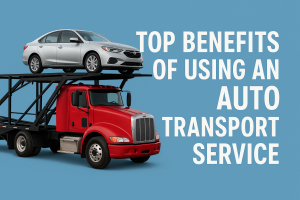Auto transport brokers are not the ones shipping your car, but they can help make sure you find the best car carrier to get it there safe and sound.
Let’s clear up some common confusion regarding auto transport brokers and car carriers. When we strip it right down to basics, the car carrier moves the vehicle from A to B and the broker is the customer’s ally in getting the right service, at the right time, and at the right price.
Together, each entity plays an important role in creating a successful auto transportation experience. Let’s spotlight precisely which services both parties provide to help make your next transport project a great one.
In this blog, you’ll learn:
- The role of the car carrier
- What an auto transport broker does
- The characteristics both parties share
- How the distinction between broker and carrier can blur
The role of the car carrier
Car carrier companies – also called auto transporters or auto haulers – can vary greatly in size from a single vehicle up to a fleet. They’re responsible for safely loading your vehicle for transport, taking it to its destination, and unloading it carefully at the other side. They’re also responsible for ensuring that weight, height, and other vehicle restrictions are strictly adhered to at all times.
The principal benefit of a car carrier is their expert knowledge of the routes they specialize in. This can be a great help in getting your vehicle to its drop off as efficiently as possible. The best carriers directly translate their route familiarity into quote and time schedules customers can have faith in, with some offering guaranteed quotes with prices that stay fixed.
Acts of God do occur, however, and carriers may fall afoul of factors beyond their control that lead to transportation problems and delays. It’s also a carrier’s job to keep the customer in the communication loop, but the demands of the road may find a driver literally has their hands too full to provide regular updates.
There can be another communication problem where carriers are concerned: There are a large number of auto transport brokers in America and, consequently, many carriers don’t deal with the public and prefer to go through a broker to reach new customers. This can make carriers difficult to reach without a broker’s assistance.
What an auto transport broker does
Brokers don’t transport vehicles themselves, but they help you locate the people who do. Perhaps the biggest perk of working with an auto transport broker is speed. This doesn’t mean that your vehicle will reach its destination faster than regulations and safety allow, but it does mean that finding the right carrier for the job becomes a great deal quicker.
Auto transport brokers do the financial work for the customer by finding carriers who fit their budget. Contacting a carrier directly will only get you a single quote; working with a broker will quickly provide multiple quotes to compare. The wide network of carriers available to a broker is often national, which is a good safeguard against the failure of any one candidate, even after a job has been undertaken.
Looking into the track record and insurance position of potential car carriers can be a time-consuming task, but this is another burden the broker takes care of. The best brokers will go beyond merely financial matters and present carriers who provide a reliable service that’s both licensed and certified.
Great brokers are also effective middlemen between customer and carrier, liaising between the two to ensure ongoing communication.
The characteristics both parties share
Brokers and carriers are required to be registered with the Federal Motor Carrier Safety Administration (FMCSA) and the U.S. Department of Transportation. This means that good carriers and brokers both adhere to a strict set of operational rules and regulations.
The two also typically operate a door-to-door (also called curb-to-curb) transportation model. This involves taking possession of your vehicle at your home, place of business, dealership, storage unit, or parking lot. The vehicle is then kept in the same trailer for the journey to a drop-off point. Due to the sheer scale of many delivery trailers, the drop off point may be a secondary location that is as close to the desired destination as possible.
Some brokers and carriers may work under the terminal-to-terminal model. Though this is often more expensive, it gives the customer more control over when they can drop off and pick up the vehicle.
How the distinction between broker and carrier can blur
Some auto transport companies have elements of both broker and carrier. For example, a fully licensed broker may also have vehicles of their own. This gives them the ability to transport without recourse to a carrier. Conversely, some carriers co-operate with other ones. which allows them to outsource delivery if their own vehicles are unavailable. This can see such a company licensed as a carrier and broker at the same time.
We recommend running a company’s name through the U.S. Department of Transport’s SAFER system if you’re unsure how to classify them. It’s free, and a quick search will reveal if that entity is registered as a carrier, a broker, or a hybrid of the two. SAFER also provides other valuable insights for customers, like a carrier’s safety and inspection records.
Ready to choose your transport model now that you know the differences? Consult our previous blog before you do! You’ll find plenty of tips on what to look out for when selecting the right team for your needs.
Mercury Auto Transport finds quotes in minutes for open, enclosed, and flatbed auto transportation. We’ve arranged safe delivery for over 186,000 vehicles by road, rail, and air while working with the most trusted shipping partners in our industry. Email info@mercuryautotransport.com or call us free at (800) 553-1828 or for a quote.






